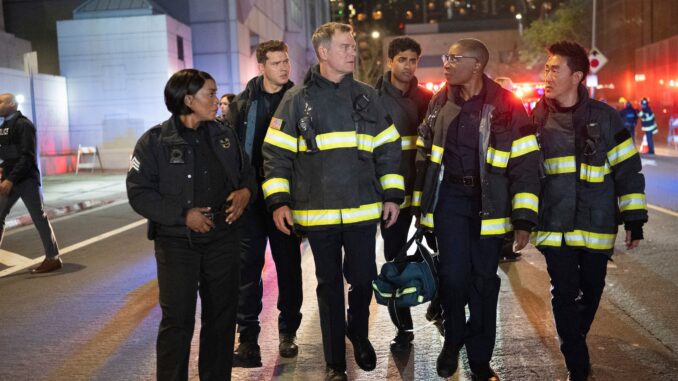
Bobby’s death in 9-1-1 was divisive for obvious reasons— the ABC procedural had never killed a main character before, and starting with the heart and soul of the 118 was certainly jarring. Yet, there was a deeper backlash surrounding the death that hasn’t waned with time. Bobby’s character had some of the most poignant arcs in all of 9-1-1, but his fatal selfless act seemed to undermine his growth. Given that he and his wife, Athena Grant (Angela Bassett), were building their dream home together, the death also disrupted what 9-1-1 season 8 promised to be their idyllic putting-down-roots period.
Beyond the poor timing and emotional whiplash, the death itself was executed poorly. Within the limited narrative of the two-part thriller, 9-1-1 could’ve easily saved Bobby from his CCHF. That nobody thought to even ask Moira Blake (Bridget Regan) about creating another antiviral is infuriating in and of itself, but the resignation that underlined Bobby’s death scene was a harrowing and unfamiliar feeling of total hopelessness. Even if the death had been an ironclad storyline, however, its very existence goes against 9-1-1’s central identity, regardless of what showrunner Tim Minear has argued since “Lab Rats” aired.
A Plot Twist No One Saw Coming
Let’s be real—when a beloved character dies, fans don’t take it lightly. And when that character is Bobby Nash from 9-1-1, things go from “shocked” to “outraged” in 0.2 seconds flat. Whether you’re a die-hard fan or a casual viewer, Bobby’s death hit like a sucker punch, and the internet has been on fire ever since. But why exactly are fans lashing out? Was it poor writing, shock value, or something deeper? Let’s unpack the drama behind one of the most controversial episodes in 9-1-1 history.
Who Was Bobby Nash, Really?
The Heart and Soul of Station 118
Bobby Nash wasn’t just another firefighter. He was the glue holding the team—and sometimes the entire storyline—together. He was a leader, a mentor, a father figure, and one of the few characters with a storyline deep enough to carry emotional weight.
Why Fans Loved Him
From his tragic backstory to his redemption arc, Bobby gave viewers someone to root for. He wasn’t perfect, and that’s what made him relatable. His flaws? Human. His courage? Inspiring. His relationships? Pure gold. So yeah, killing him off wasn’t just unexpected—it felt wrong.
The Episode That Broke the Internet
The Build-Up Was Too Quiet
It wasn’t a dramatic exit filled with warnings. There were no signs. No foreshadowing. Just BAM—Bobby’s gone. And viewers were left yelling at their TVs and reaching for tissues (and Twitter).
Was It For Shock Value?
Let’s not sugarcoat it—networks love a good shocker. It’s ratings gold. But was this death genuine storytelling or just a plot twist tossed in for drama’s sake?
The Fan Backlash Was Immediate
Social Media Went Ballistic
From Reddit threads to TikTok reactions, fans didn’t hold back. Words like “betrayal,” “nonsense,” and “rage” started trending alongside #BobbyNash and #911onFOX.
Fan Petitions Are Piling Up
Yup, you read that right. Multiple petitions are circulating online begging the showrunners to either bring Bobby back or at least explain themselves better.
The Writers’ Intentions vs. Audience Reaction
Trying to Keep the Show Fresh?
Writers often shake things up to prevent storylines from going stale. But there’s a fine line between innovation and alienation—and 9-1-1 might’ve just crossed it.
Did They Miscalculate Fan Loyalty?
Killing Bobby wasn’t just a plot point; it was a betrayal of viewer investment. You spend seasons building love for a character, and then—just like that—it’s gone.
The Emotional Fallout Within the Show
Athena’s Devastation
Bobby’s death didn’t just wreck fans—it shattered Athena. Watching her navigate grief was gut-wrenching, and viewers weren’t ready for it.
The Team’s Spiral
From Chimney to Buck, the entire Station 118 felt unbalanced. And maybe that was the point—to explore how grief affects a family. But did we need to kill Bobby for that?
The Timing Felt Off
Mid-Season Mayhem?
Killing off a lead character mid-season? That’s a bold move. Risky, even. Most shows save that kind of shocker for finales—not random episode 9.
Is This the End or a Fake-Out?
Theories Are Swirling
Some fans think Bobby’s death isn’t real. Maybe it’s a dream sequence. Maybe he’s missing, not dead. With a show like 9-1-1, anything’s possible, right?
TV Has a History of Resurrections
From Grey’s Anatomy to The Walking Dead, TV is full of fake deaths and miracle returns. So yeah, hope isn’t completely lost.
Could This Damage the Show Long-Term?
Losing Trust = Losing Viewers
When fans feel betrayed, they stop watching. It’s that simple. And 9-1-1 is already teetering on a dangerous edge.
A Risk That Might Not Pay Off
Sure, the episode got attention—but at what cost? Long-time viewers might check out for good if they feel like their loyalty doesn’t matter.
Was There Another Way?
Write Him Out Without Killing Him
There are a dozen ways to retire a character without burning everything down. Bobby could’ve left town, taken a new job, or even gone on medical leave.

What This Says About Modern TV Writing
The Death Trap Trope
Too many shows rely on death to make headlines. But does it always make sense for the story? Nope. Not even close.
Storytelling vs. Shock Value
Great writing builds moments that mean something. Cheap twists might get clicks—but they don’t build legacy.
What’s Next for 9-1-1?
Rebuilding Trust
The writers now face a huge task: winning fans back. That might mean flashbacks, deeper character arcs, or (fingers crossed) a shocking return.
Conclusion: Bobby Deserved Better—And So Did We
Let’s not pretend Bobby was “just a character.” For many, he was the reason they tuned in week after week. Killing him off so abruptly didn’t just hurt the narrative—it hurt the audience. Maybe the writers thought they were being bold. Maybe they wanted to shake things up. But all they really did was shake fans’ trust. Could there be a twist coming? Sure. But unless they handle this with care, the damage might already be done.